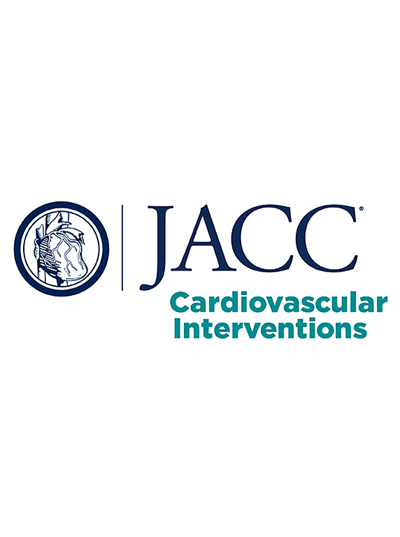异位经导管三尖瓣置换术治疗三尖瓣反流
IF 11.7
1区 医学
Q1 CARDIAC & CARDIOVASCULAR SYSTEMS
引用次数: 0
摘要
经导管三尖瓣介入治疗是严重三尖瓣反流(TR)患者的一种新兴治疗方法,但很大一部分TR患者不适合原位三尖瓣(TV)入路。本研究的目的是探讨一种专用异位瓣膜置换术系统在重度或重度tr患者中的应用效果。方法本单臂、多中心研究评估了使用Trillium装置30天异位跨腔静脉经导管电视置换术的技术性能、疗效和安全性。严重或更严重的TR患者不适合手术或其他介入性原位电视治疗。结果在2021年至2023年期间,纳入了20例患者(中位年龄81岁,40%为女性)。所有病例均成功植入器械,未发生术中死亡或转手术。术后,中心静脉压降低(中位数- 3mmhg;Q1-Q3:−5 ~−1 mm Hg;P = 0.003),所有病例在Trillium装置水平评估的TR严重程度均有所降低(P <;0.001)。随访30天,死亡1例,心力衰竭住院2例,血液透析2例,大出血2例。NYHA功能分级有改善(P = 0.005),水肿严重程度评分有降低的趋势(中位数- 0.5;Q1-Q3:−1 ~−0;P = 0.052)。结论Trillium装置是一种安全、有效的治疗重度或重度TR患者的设备。该装置可改善TR负担的血流动力学和症状,这是否转化为有利的结果有待随机试验证明。本文章由计算机程序翻译,如有差异,请以英文原文为准。
Heterotopic Crosscaval Transcatheter Tricuspid Valve Replacement for Patients With Tricuspid Regurgitation
Background
Transcatheter tricuspid interventions are an emerging therapy for patients with severe tricuspid regurgitation (TR), but a significant proportion of patients with TR are unsuitable for orthotopic tricuspid valve (TV) approaches.
Objectives
The aim of this study was to investigate the performance of a dedicated heterotopic valve replacement system in patients with severe or greater TR.
Methods
This single-arm, multicenter study assessed the technical performance, efficacy, and safety of heterotopic cross-caval transcatheter TV replacement using the Trillium device at 30 days. Patients with severe or greater TR ineligible for surgical or other interventional orthotopic TV treatment were included.
Results
Between 2021 and 2023, 20 patients (median age 81 years, 40% women) were included. Device implantation was successful in all cases, and no intraprocedural deaths or conversions to surgery occurred. Postprocedurally, central venous pressure was reduced (median −3 mm Hg; Q1-Q3: −5 to −1 mm Hg; P = 0.003), and TR severity as assessed at the level of the Trillium device was reduced in all cases (P < 0.001). Within the 30-day follow-up period, 1 patient died, 2 patients experienced heart failure hospitalization, 2 required hemodialysis, and 2 experienced major bleeding. There was an improvement in NYHA functional class (P = 0.005) and a trend toward a reduction in edema severity score (median −0.5; Q1-Q3: −1 to −0; P = 0.052).
Conclusions
The Trillium device is a safe and effective device for the treatment of patients with severe or greater TR ineligible for other therapeutic options. The device leads to a hemodynamic and symptomatic improvement of the burden of TR, whether this translates into favorable outcomes is to be proven in randomized trials.
求助全文
通过发布文献求助,成功后即可免费获取论文全文。
去求助
来源期刊

JACC. Cardiovascular interventions
CARDIAC & CARDIOVASCULAR SYSTEMS-
CiteScore
11.60
自引率
8.80%
发文量
756
审稿时长
4-8 weeks
期刊介绍:
JACC: Cardiovascular Interventions is a specialist journal launched by the Journal of the American College of Cardiology (JACC). It covers the entire field of interventional cardiovascular medicine, including cardiac, peripheral, and cerebrovascular interventions. The journal publishes studies that will impact the practice of interventional cardiovascular medicine, including clinical trials, experimental studies, and in-depth discussions by respected experts. To enhance visual understanding, the journal is published both in print and electronically, utilizing the latest technologies.
 求助内容:
求助内容: 应助结果提醒方式:
应助结果提醒方式:


